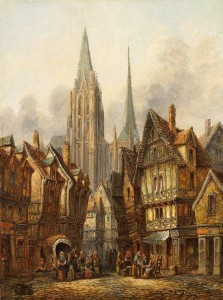 Cities and towns crop up frequently in most RPG campaigns, assuming you’re not spending all your time in a megadungeon. Given their importance in establishing a setting in general and in immediate game events, I’ve never been very happy with the way most RPGs deal with them. Published town descriptions all too often focus on material aspects that provide interesting color but seldom are factors in actual play. If there’s a map, odds are high that it shows an inn, a blacksmith’s shop, the mayor’s home, possibly a barracks, and dozens of unlabeled buildings. What a bland mix.
Cities and towns crop up frequently in most RPG campaigns, assuming you’re not spending all your time in a megadungeon. Given their importance in establishing a setting in general and in immediate game events, I’ve never been very happy with the way most RPGs deal with them. Published town descriptions all too often focus on material aspects that provide interesting color but seldom are factors in actual play. If there’s a map, odds are high that it shows an inn, a blacksmith’s shop, the mayor’s home, possibly a barracks, and dozens of unlabeled buildings. What a bland mix.
The most important point to understand about towns and cities is that they’re not collections of buildings; they’re collections of people, with the emphasis on collection. A few individuals will stand out from any group, but groups themselves have important characteristics. Individuals are unique and unpredictable, but groups can be qualified and quantified in interesting and reliable ways. The ways of doing so are what I’m chiefly interested in.
What follows is a series of short tables that you can use to generate collective qualities and attitudes for the people of a town. Each table determines an attitude, outlook, need, or other characteristic of the townspeople as a group. One set of characteristics can easily cover an entire small town. In a larger city, discrete neighborhoods, guilds, religious sects, or ethnic groups can be treated separately. Give each group its own characteristics.
I don’t pretend that my approach is exhaustive or definitive, but it works for me. Use whichever of these tables you like, ignore those you don’t like, and add others of your own design. There’s no great need to be consistent from town to town; what’s right in one place might be unnecessary somewhere else.
I haven’t provided a lot of detail on specific entries, because the real fun is interpreting the results.
Social Organization: How do the people organize themselves? Who do they consider “family?”
- Patriarchy
- Matriarchy
- Clans or tribes
- Castes (social, occupational, religious, or age-based)
- Trade guilds
- Mixture
Social Strength: This represents the solidity of the town’s institutions, the people’s faith in their leaders, and their respect for authority.
- In revolt or collapse
- Crumbling institutions, social upheaval
- Change is part of progress
- Stable society
- Tradition rules
- Fanatics; roll again to determine their brand of fanaticism
- Pacifism
- Militarism
- Religion or atheism
- Law or chaos
- Good or evil
- Xenophobia
Ethical Strength: Use this rating to judge the trustworthiness of an informant, the honesty of a merchant, or the openness of an official to bribery.
- It’s every person for himself or herself
- Corruption is a fact of life
- Get it in writing
- Trust but verify
- People are born good
- People keep their promises
Valued Qualities: Who do the locals look up to? What impresses them?
- Valor and honor
- Wealth
- Nobility
- Scheming and intrigue
- Military prowess
- Knowledge and magical prowess
Tolerance of Outsiders: When characters first arrive, a roll above the town’s tolerance rating can mean the PCs have aroused suspicion.
- Hostile and suspicious even of fellow citizens
- Hostile and suspicious of outsiders
- Mistrustful of any who stand out as different
- Mistrustful of new arrivals but warm over time
- Generally welcoming
- Friendly toward all
This second table can determine what specific bias the citizens hold.
- Race
- Religion
- Country of origin
- Alignment
- Wizards are trouble
- Adventurers in general are trouble
Expectations of Outsiders: What do locals want from outsiders?
- Conversion to their way of life
- Respect for local customs
- News of the larger world
- Free-flowing wealth
- Help against bandits, monsters, invaders, or oppressors
- Help with a local problem that isn’t solved easily through force

Very nice. These are the things that, when my players wander into a new town, I struggle to throw together on the spot and I often forget.
I could roll a few of these up faster than I can roll a new NPC up and that will save a lot of time. Great article!
I like such articles that expand your mindset as you design a world element, in this case the personality of a settlement. It gets me out of my typical “well, the villagers are suspicious, but will let you stay if you help them” approach, which I’m sure happens to other DMs as well. Now I will consider more closely their attitudes towards adventurers with a broader palette of flavorful ideas.
Thanks!
That’s what a few random rolls do best — trigger and guide imagination without replacing it.
Very useful article. Bookmarked, and I expect to use it a lot in the future. I’ll need to remember to write down what attitudes my players encounter in a given town so that when they leave and return they don’t encounter too conflicting of personalities from when they came around last. In a large city it might not be unusual, but in some small hamlet it would be.
Great post, I will definitely be using this to help my efforts in an upcoming gaming marathon that we are calling the “Solstice Dungeon Classic”. thanks!